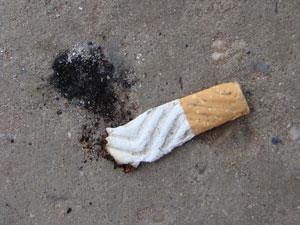
Raymond Robertson from the acetate business of Celanese Corporation, Narrows, Virginia, has been working with colleagues to develop a filter that contains a controlled-release organic acid to catalyse the hydrolysis of the filter material – cellulose acetate polymer. ‘Our work focuses on expediting the filter degradation back to cellulose and acetic acid using edible materials, such as citric acid and ascorbic acid (vitamin C), to help promote the filter degradation rate,’ he says. ‘Increasing the degradation rate decreases the filter persistence in the environment.’
The weak organic acid is encapsulated in the filter paper to protect it from premature degradation and to prevent a decrease in the product’s shelf life. Once the cigarette is used and discarded, environmental water (such as rainwater) breaches the protective layer. This releases the acid, which migrates into the filter, lowering the pH and triggering hydrolysis.
Zhenjiang Li from Nanjing University of Technology, China, comments: ‘It is a remarkable breakthrough in addressing the cigarette filter pollution.’ A researcher in the fields of green chemistry and polymers, Li is impressed with the results. ‘The team have combined simple chemistry with current industrial processes.’
For Robertson, future developments involve refining the technology to suit a variety of environments, such as developing a coating and release technology that can work in very wet conditions.
References
- R M Robertson et al, Green Chem., 2012, DOI: 10.1039/c2gc16635f






No comments yet